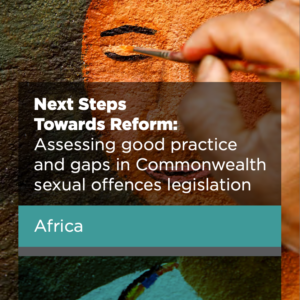Sierra Leone’s sexual offences laws are in the Sexual Offences Act 2012 (SOA) and the Offences Against the Person Act 1861 (OAPA). The Courts Act 1965 preserves the British common law as in force on 1 January 1880 where not superseded by subsequent legislation. In addition to statutory law, the Constitution preserves customary laws which vary across the country and, in many cases include Islamic law.
In its Common Core Document to the UN human rights treaty bodies in 2012, the government of Sierra Leone stated that 70% of the population do not have access to the formal justice system. Many people therefore are regulated by customary law, as applied by their local chiefs rather than statutory law. The common law, relevant case law, customary and Islamic law relating to sexual offences in Sierra Leone are not assessed in this review as they are outside its scope.
The SOA meets a number of important good practice criteria applied in this report. For example, sexual assaults are gender-neutral, ‘consent’ is defined as free choice by a person with the capacity to choose freely to engage in sexual activity, the offence of rape includes sexual penetration of genitals by any body part or object, and the law does not use derogatory terms to refer to people with disability. Marital rape and sexual assault are crimes.
In other respects, however, the law does not meet good practice. Sierra Leone criminalises consensual sexual activity between men as ‘buggery’ and ‘crimes against nature’ with penalties of up to life imprisonment. The OAPA, which contains the offence of ‘buggery’, has not been amended and states the law as it was in force in England and Wales in 1880. Laws that criminalise consensual same-sex sexual activity should be repealed and all non-consensual sexual acts, including anal ‘rape’, should be included in the general sexual assault provisions, such as ‘rape’ and ‘sexual assault’, as well as in child sexual offences. All of these crimes should be gender-neutral.
Further, the law allows the defence of consent to child sexual offences in some cases. There are no close-in-age defences to child sexual assault to prevent young people being criminalised for consensual sexual activity with their peers.
Sierra Leone is a state party to relevant international and regional human rights treaties, including the Convention on the Elimination of All Forms of Discrimination against Women, Convention on the Rights of the Child, Convention on the Rights of Persons with Disabilities, International Covenant on Civil and Political Rights and Convention against Torture and Other Cruel, Inhuman or Degrading Treatment or Punishment. Sierra Leone is also a party to the African Charter on Human and Peoples’ Rights and the Protocol to the African Charter on Human and Peoples’ Rights on the Rights of Women in Africa (Maputo Protocol).
Read more about the criminalisation of LGBT people in Sierra Leone.
The full assessment of Sierra Leone is also available here.



